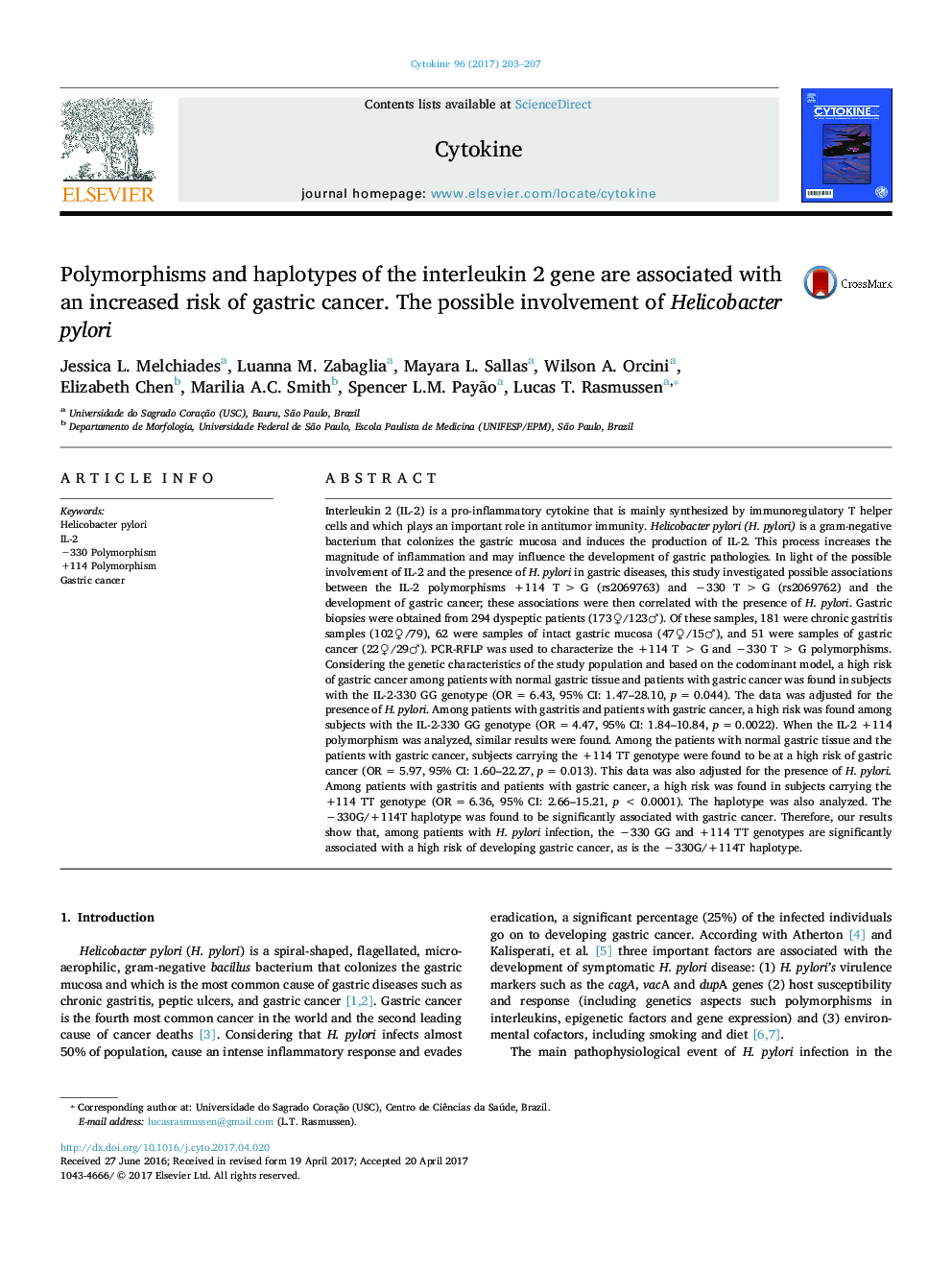| کد مقاله | کد نشریه | سال انتشار | مقاله انگلیسی | نسخه تمام متن |
|---|---|---|---|---|
| 5586994 | 1568716 | 2017 | 5 صفحه PDF | دانلود رایگان |
عنوان انگلیسی مقاله ISI
Polymorphisms and haplotypes of the interleukin 2 gene are associated with an increased risk of gastric cancer. The possible involvement of Helicobacter pylori
ترجمه فارسی عنوان
پلیمورفیسم و هپلوتیپ های ژن اینترلوکین 2 با افزایش خطر سرطان معده همراه است. دخالت احتمالی هلیکوباکتر پیلوری
دانلود مقاله + سفارش ترجمه
دانلود مقاله ISI انگلیسی
رایگان برای ایرانیان
موضوعات مرتبط
علوم زیستی و بیوفناوری
بیوشیمی، ژنتیک و زیست شناسی مولکولی
علوم غدد
چکیده انگلیسی
Interleukin 2 (IL-2) is a pro-inflammatory cytokine that is mainly synthesized by immunoregulatory T helper cells and which plays an important role in antitumor immunity. Helicobacter pylori (H. pylori) is a gram-negative bacterium that colonizes the gastric mucosa and induces the production of IL-2. This process increases the magnitude of inflammation and may influence the development of gastric pathologies. In light of the possible involvement of IL-2 and the presence of H. pylori in gastric diseases, this study investigated possible associations between the IL-2 polymorphisms +114 T > G (rs2069763) and â330 T > G (rs2069762) and the development of gastric cancer; these associations were then correlated with the presence of H. pylori. Gastric biopsies were obtained from 294 dyspeptic patients (173â/123â). Of these samples, 181 were chronic gastritis samples (102â/79), 62 were samples of intact gastric mucosa (47â/15â), and 51 were samples of gastric cancer (22â/29â). PCR-RFLP was used to characterize the +114 T > G and â330 T > G polymorphisms. Considering the genetic characteristics of the study population and based on the codominant model, a high risk of gastric cancer among patients with normal gastric tissue and patients with gastric cancer was found in subjects with the IL-2-330 GG genotype (OR = 6.43, 95% CI: 1.47-28.10, p = 0.044). The data was adjusted for the presence of H. pylori. Among patients with gastritis and patients with gastric cancer, a high risk was found among subjects with the IL-2-330 GG genotype (OR = 4.47, 95% CI: 1.84-10.84, p = 0.0022). When the IL-2 +114 polymorphism was analyzed, similar results were found. Among the patients with normal gastric tissue and the patients with gastric cancer, subjects carrying the +114 TT genotype were found to be at a high risk of gastric cancer (OR = 5.97, 95% CI: 1.60-22.27, p = 0.013). This data was also adjusted for the presence of H. pylori. Among patients with gastritis and patients with gastric cancer, a high risk was found in subjects carrying the +114 TT genotype (OR = 6.36, 95% CI: 2.66-15.21, p < 0.0001). The haplotype was also analyzed. The â330G/+114T haplotype was found to be significantly associated with gastric cancer. Therefore, our results show that, among patients with H. pylori infection, the â330 GG and +114 TT genotypes are significantly associated with a high risk of developing gastric cancer, as is the â330G/+114T haplotype.
ناشر
Database: Elsevier - ScienceDirect (ساینس دایرکت)
Journal: Cytokine - Volume 96, August 2017, Pages 203-207
Journal: Cytokine - Volume 96, August 2017, Pages 203-207
نویسندگان
Jessica L. Melchiades, Luanna M. Zabaglia, Mayara L. Sallas, Wilson A. Orcini, Elizabeth Chen, Marilia A.C. Smith, Spencer L.M. Payão, Lucas T. Rasmussen,
